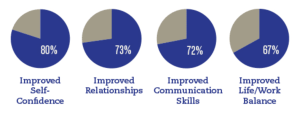It’s surely one of the biggest paradoxes in working life.
Staff consistently say they want greater flexibility to achieve a better work-life balance.
But, for one reason or another, employees claim they either run up against barriers at work, or they accuse managers of facilitating a working culture that somehow seems to get in the way of actually enabling a better work-life balance to be struck.
Management will – of course – refute that such a reality exists, and that they provide all the policies staff need for achieving a better relationship between their work lives and home lives. And so the loggerhead continues.
It’s an impasse that Elizabeth Weingarten, head of behavioral science insights at people development platform, Torch, describes as “part of the at-work narrative that says if staff can’t achieve a work-life balance then it must be their fault.”
So is she right?
Well, in today’s exclusive interview with her, Weingarten puts a compelling case across. But she also says coaching is the vital element that’s often missing when it comes to helping staff achieve their desired work-life balance.
Why? It’s only though this, she claims, that staff have the tools to know how to better make their case for it, or feel less self-conscious for wanting to pursue it in the first place.
To find out more, we chatted to her:
Q: Work-life balance and coaching aren’t usually mentioned in the same sentence, so what’s your rationale behind why they are actually linked?
A: “Employees are often made to feel like it’s ‘them’ that explains why they don’t have a good work-life balance. The narrative is that it can’t possibly be the company’s problem, because the company has all the policies in place to help people achieve it. Where coaching is important is that it helps staff disentangle the things that are out of their control but which might be a barrier to them achieving a good work-life balance. Companies often talk a good game when it comes to promoting flexibility – like giving staff unlimited time off – but the messaging from on-high is often the opposite of this – that people only get on in the organization when they devote their whole life to it. These mix-messages typically only worsen people’s sense of self worth. Coaching is predicated on helping people identify which behaviours people can affect, and show people what structures they are up against.”
Q: Would revealing to staff what they’re up against only make them feel worse?
A: “Not necessarily. First of all, allowing them to see more clearly equips staff with the choice of whether they really want to stay at this organization. But far more likely, is that I believe it gives staff the skillset they actually need to be able to talk through options with managers. It provides better mastery of skills needed to have more reasoned conversations about why work-life balance is important and how it can be achieved. It’s often the case that issues around work-life balance appear in the first place because no one feels equipped with the tools or confidence to properly push back on managers when they set out how long projects might take. In essence, the right parameters need setting first, so that asking for options around work-life balance aren’t abnormal.”
Q: One can see the benefit of coaching might bring to staff, but won’t HR simply see this as them equipping staff with tools to ‘speak out’ and become barriers to change?
A: “My hope would be that HR should support giving staff tools to learn and grow. Yes, there’s a risk – always – that staff will use these tools in a way that is not perfectly ideal. But while there will always be those who may worry about this, I’m sure that most HR leaders regard L&D as helping their staff to thrive rather than it causing disruption. There’s plenty of evidence that shows there is a very strong correlation between providing coaching and it linking through to organizations being high-performing organizations.”
Q: Is coaching a solution that could disproportionately help women?
A: Absolutely. We still live in a world where women do most of the care work – either caring for their own children, or their elderly parents. Also, it’s women that often do what’s referred to as the ‘non-promotable tasks’ – all those essential things that are needed around the workplace, but which are often invisible to most people, and doesn’t see them elevated in the eyes of top management. A particular barrier is that when women are assertive, it’s often couched as them being ‘aggressive’ or in un-flattering gendered language – the sort of language you wouldn’t see used against men for the exhibiting same behaviour. Coaching can help women navigate all of this, and help them ask the right questions in the right way, so they don’t come across in the way there are often preconceptions about them. One-on-one coaching will do this, but 360-degree coaching is particularly useful here too. What I would say though, is that coaching is not a way to ‘fix’ women; it’s there to elicit holistic conversations.
Q: So, to help staff get a better work-life balance, they need coaching skills first?
A: “It will certainly help. It will help people unpack the problem better and whether there’s something that needs to be fixed or not. We’re fortunate that work-life balance has become much more commonly talked about, but it’s still the case that it’s harder to achieve than it ought to be for many workers. A big part of this is the fact companies aren’t equipping employees with the support they need.”
What the stats say:
According to IBM’s Institute for Business Value , work-life balance is most eagerly wanted, while lack of it is the top reason people seek pastures new


What providing coaching does:
According to studies from the International Coach Federation, when people work with a professional coach, they attain a better work-life balance:

